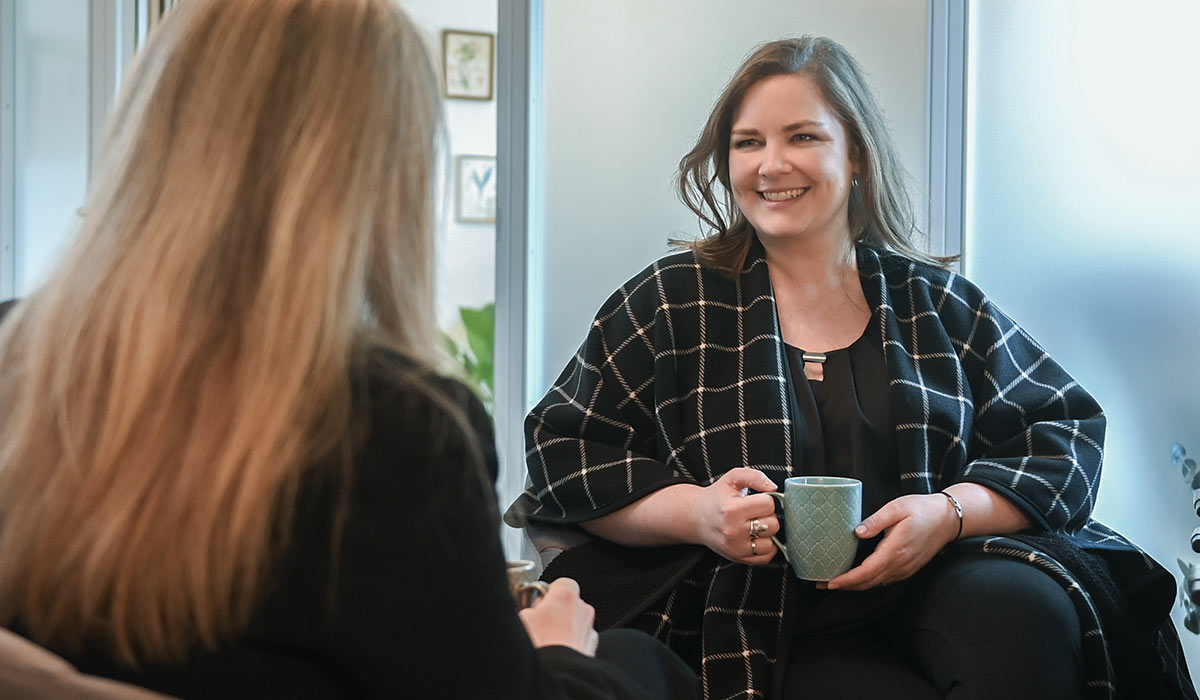I’m glad you asked!
Stress is caused by the impression of not having the appropriate resources available to cope with a situation. This can give rise to emotions such as helplessness, insecurity, frustration, sadness and many more.
For me, for example, this happens when I try to practise Latin with my daughter. At least I know now that our question mark is a stylised representation of the abbreviation “qo” of the Latin word for question “quaestio”.
Questions activate the prefrontal cortex – the part of our brain responsible for analytical thinking and problem solving. This reduces activity in the limbic system, which is responsible for emotional reactions such as fear or anger. Questions therefore help us switch to rational and solution-orientated thinking and at the same time structure our thoughts. They promote our sense of belonging because they deepen communication and strengthen interpersonal connections.

Questions are a tool for organising thoughts and feelings, finding solutions and regaining control
When is a question a good question?
You can practise asking others – or yourself – good questions and thus actively influence the stress levels of everyone involved.
Here are 10 principles to help us do this:
- Curiosity and genuine interest: Good questions arise from genuine interest in the person, the topic or the situation. What do you really want to know about the other person? Genuine interest and openness are the basis for valuable conversations and valuable insights.
- Open and inviting formulations: Avoid closed questions (which can only be answered with “yes” or “no”) unless they are specifically helpful. Instead of “Did you like that?” you could prefer “What did you particularly like about it?”. Open questions encourage deeper conversations and reflection.
- Simple and clear questions: Complicated or multi-part questions can be confusing. Better use: “What inspired your decision?” instead of “Why and how did you decide to do exactly that?”.
- Empathy: Adapt your questions to the mood and needs of the other person. If someone is very emotionally upset, ask “How do you feel in this situation?” rather than “Why did you do that?”.
- Listen attentively: Good questions build on what the dialogue partner says. Use clues from the conversation to ask further questions or expand on the topic. Example: “You mentioned that you were insecure – what helped you to overcome this?”.
- Avoid judgemental or suggestive questions: Questions should not be manipulative, but neutral and open. Better use: “What do you think about this?” instead of “Don’t you think this is a bad idea?”.
- Adapt the context: Small talk, a deep conversation or a professional meeting naturally require different types of questions. Whereby asking good questions can quickly turn a small talk into a deep conversation with a strong connection.
- REncourage reflection and creativity: Questions that encourage reflection invite more in-depth discussion. Example: “How do you imagine an ideal solution?” or “What would you do if you had no restrictions?”.
- Give time and space: Give the other person time to think about your question. Do not interrupt them and listen attentively.
- Experiment with new perspectives: Use hypothetical or “what if” questions to encourage creative answers. Example: “What would you do if the budget didn’t matter?”
„I would rather have questions that cannot be answered than answers that cannot be questioned.“
Richard Feynman
How can I make targeted use of questions in stressful moments?
Here are some questioning strategies that can help you to reduce your feelings of stress.
Ask yourself clarifying questions:
• What exactly is stressing me out right now?
• What is in my control and what is not?
• What do I need to feel better?
These questions will help you to substantiate the diffuse feeling of stress and make it tangible.
Use solution-orientated questions:
• What is the next step I can take?
• What resources are available to me?
• Who could help me?
Such questions direct your focus to what you can actively do.
Interrupt negative thoughts with reflective questions:
• How realistic is my fear?
• What advice would I give to a friend in this situation?
• How important will it be in a month, a year or ten years?
These questions put your worries into perspective and create distance from intense emotions.
Create a change of perspective
• What can I learn from this situation?
• What am I grateful for despite the challenge?
• How could the things that stress me out have a positive effect in the long term?
These questions promote self-efficacy and optimism – two important resilience factors – and help to transform feelings of stress into potential for growth.
When I find myself focusing my energy on things I can’t influence, my go-to question is “What is in my control and what is not?”. In my mind’s eye, it directs me to the wonderful and simple model from Stephen Covey’s book “The 7 Habits of Highly Effective People”: the Circle of Influence model. The outermost ring of the circle is the Circle of Concern. I have no influence on the things in this area, even if I think about them endlessly. It takes unnecessary energy to circle around things mentally and emotionally that I cannot change. One ring further in is the Circle of Influence. Here I can influence things indirectly through people in my environment, such as colleagues, friends and family members. I can inspire and motivate them to adapt their actions and thus indirectly initiate change. And then at the very centre is the Circle of Control. Here are the things that I can change with my own actions, my area of control. This is where it makes sense to utilise my resources. Especially in a family and partnership context, the conscious differentiation between Circle of Influence and Circle of Control can lead to surprising insights. It can reduce enormous conflict potentials – and therefore stress!
Which questions reduce your stress?


